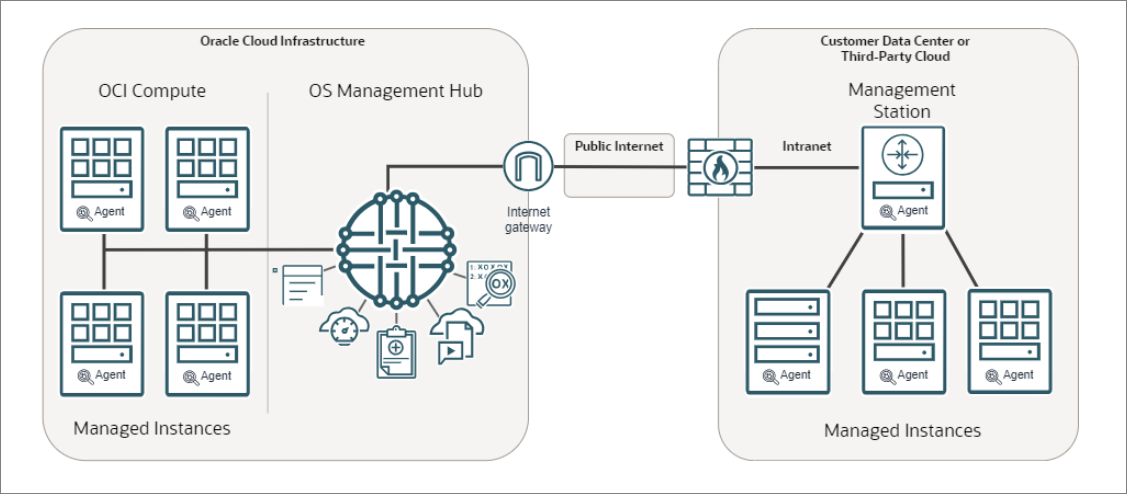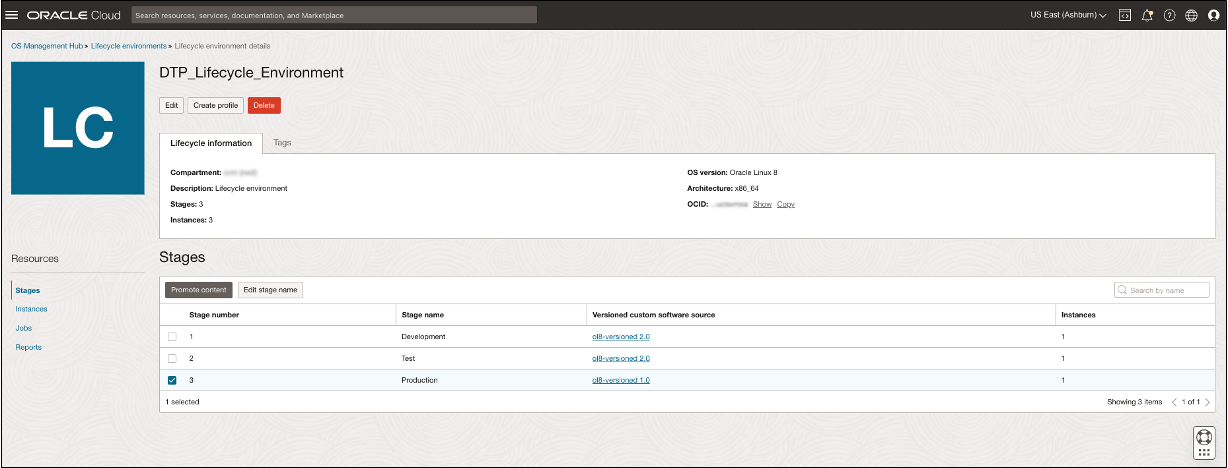We’re pleased to announce Oracle OS Management Hub, our next-generation operating system (OS) management service. Organizations are often faced with the challenge of keeping up to date with critical security updates and managing OS deployments across their application infrastructure, whether they’re in the cloud or on-premises. Using the OS Management Hub service, you can automate, streamline, and simplify the management and monitoring of updates and patches for Oracle Linux systems through a single management console in Oracle Cloud Infrastructure (OCI).
OS Management Hub manages Oracle Linux systems across distributed environments—in private data centers, OCI, Microsoft Azure, and Amazon Web Services (AWS)—making it easy for you to view and manage your OS deployments at scale. This release includes support for managing Microsoft Windows Server instances on OCI.
Live webinar: Discover how to simplify management of your distributed environments
Find out more about Oracle’s next-generation OS management service by registering to attend our semi-annual State of the Penguin event, Oracle OS Management Hub simplifies management of your distributed environments on May 16, 2024 at 9:00 a.m. PT, featuring Wim Coekaerts, executive vice president of Oracle Linux development, and Robert Shimp, senior vice president of Oracle Linux product management.
Automation helps increase security, reliability, and reduce complexity
Operating systems require constant administration and management to help ensure security compliance, high availability, and optimal performance. Manual patch management and maintaining self-supported, in-house management tools can be labor-intensive and require specialized expertise. OS patching can be error-prone and complex to manage throughout development lifecycle environments, especially for larger deployments that need to scale. OS Management Hub allows you to automate patching, which can help your organization improve productivity, operate more efficiently, and enable IT resources to focus on tasks directly related to the business.
OS Management Hub helps your systems stay compliant and reliable, while reducing your administration workload. It allows you to easily automate your patching policies and schedules with customizable configuration options and an intuitive interface. It helps reduce management complexity and human error and allows you to achieve greater operational efficiency and scalability with fleet management capabilities. Integration with Oracle Ksplice provides more management control with zero-downtime Oracle Linux kernel and userspace (glibc, openssl) updates. In addition to the console interface, a CLI and an API with software developer kits (SDKs) are available to allow you to customize the service to your organization’s needs.
Let’s explore OS Management Hub’s features in more detail and see how they can benefit your organization.
Built on a highly available and scalable service architecture
OS Management Hub is built on OCI’s highly reliable and scalable infrastructure. Key advantages of OS Management Hub as a cloud service include greater operational efficiency and an increase in administrative and capital cost savings. As your deployment scales and changes, you can easily add on-premises or cloud instances for OS Management Hub to manage. The service is backed by 24/7 expert Oracle support, helping to ensure high availability.
To manage Oracle Linux systems that are on-premises, on Azure, or on AWS, you must deploy one or more management stations. A management station serves as a proxy for the OS Management Hub service in OCI. It mirrors software repository content to your data center and distributes updates locally to instances, reducing the amount of bandwidth used for patching instances. Only management stations are required to communicate directly with the OCI service. Instances communicate directly with their local management station, receive their OS content from the management station, and don’t require direct connectivity with the service. Management stations allow you to scale efficiently and manage and curate content and updates specific to each department or application deployment.
Management agents are deployed on managed instances and on the management station. The management agent interacts with the OS content on an instance as directed by OS Management Hub and reports data and results back to the service.
To manage Oracle Linux and Windows Server instances on OCI, a management station isn’t required. Management agents are included by default on supported OS platform images deployed within OCI.
For instructions and videos on how to set up and configure OS Management Hub, refer to the documentation.
At-a-glance view of security compliance
OS Management Hub provides a summary dashboard of your managed instances across your distributed environment. The dashboard helps monitor out of compliance patching statuses, displays the number of instances with available security and bug updates, and helps ensure that instances are communicating with the service. You can drill down to view a detailed security updates report, and view advisories and schedule available updates directly from the Oracle Cloud Console.
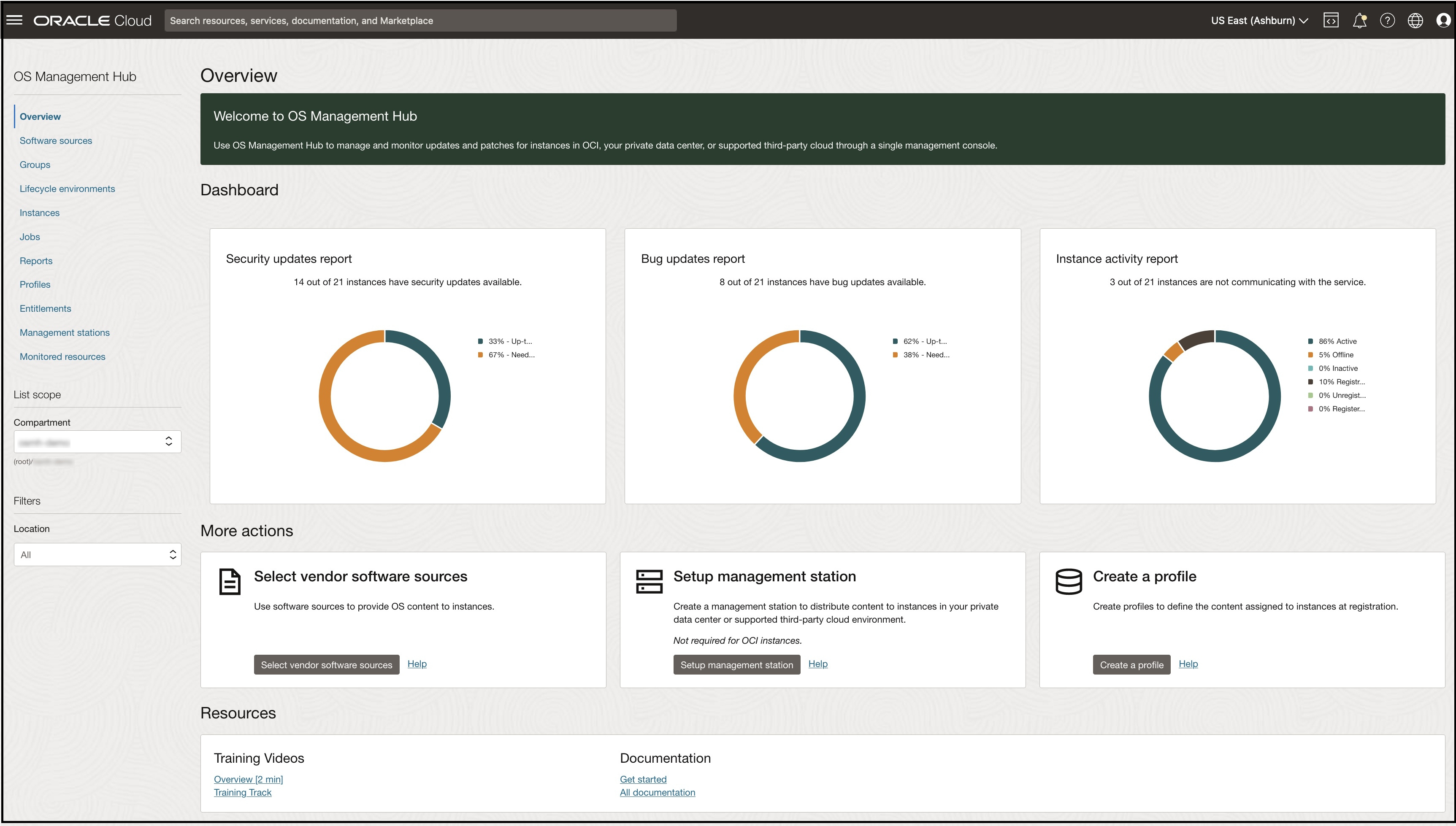
Manage instances and groups with ease
Managing your Oracle Linux and Windows fleet of instances across distributed environments is easy using OS Management Hub’s intuitive console. To manage Oracle Linux instances, you can filter and search for available and installed updates, apply updates, install and remove packages, and configure modules.
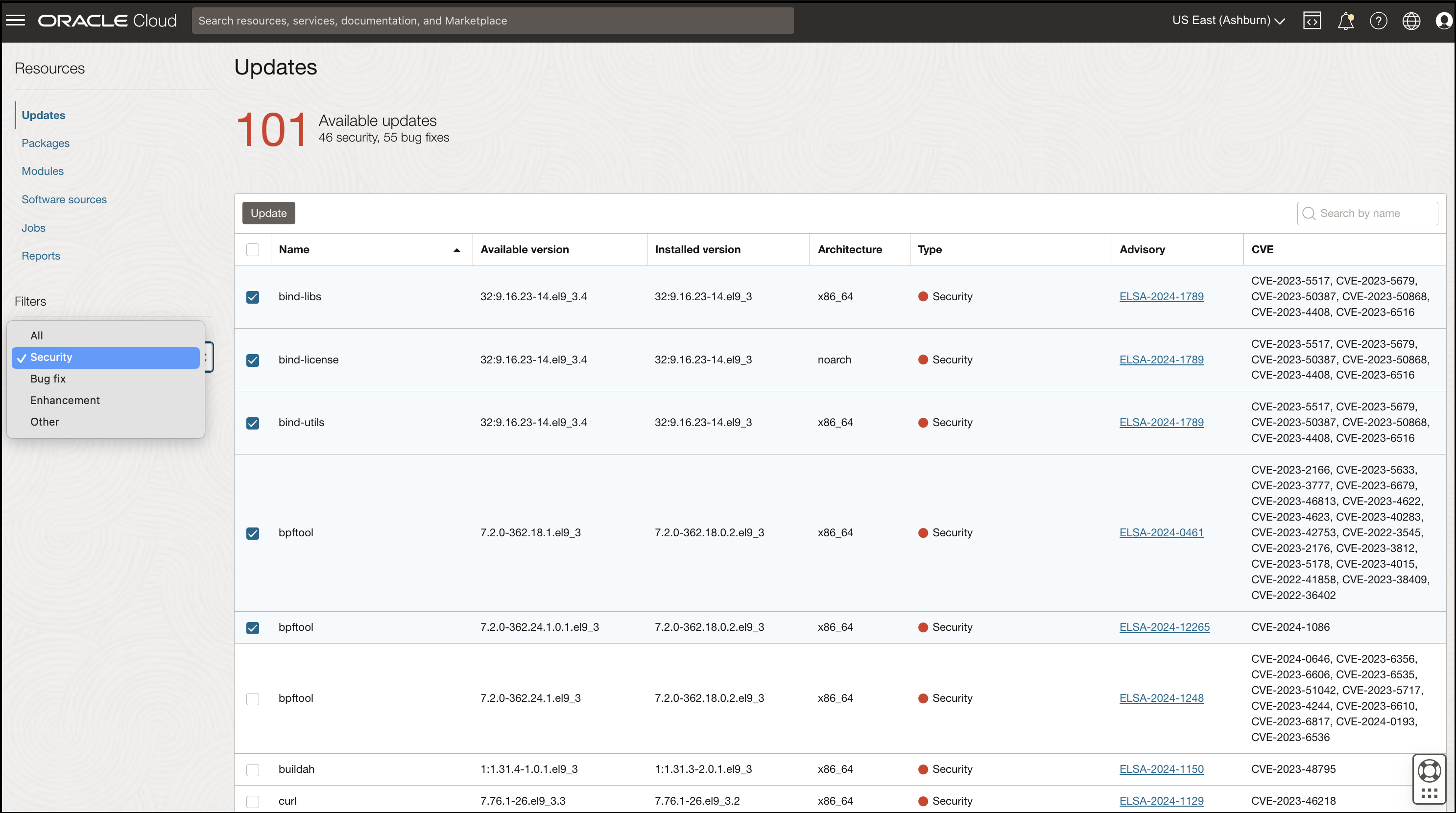
Flexible update options allow you to run any of or all the available Oracle Linux security, Ksplice (kernel, userspace), bug, enhancement, and other updates. You can run update jobs immediately or on a one-time or recurring schedule.
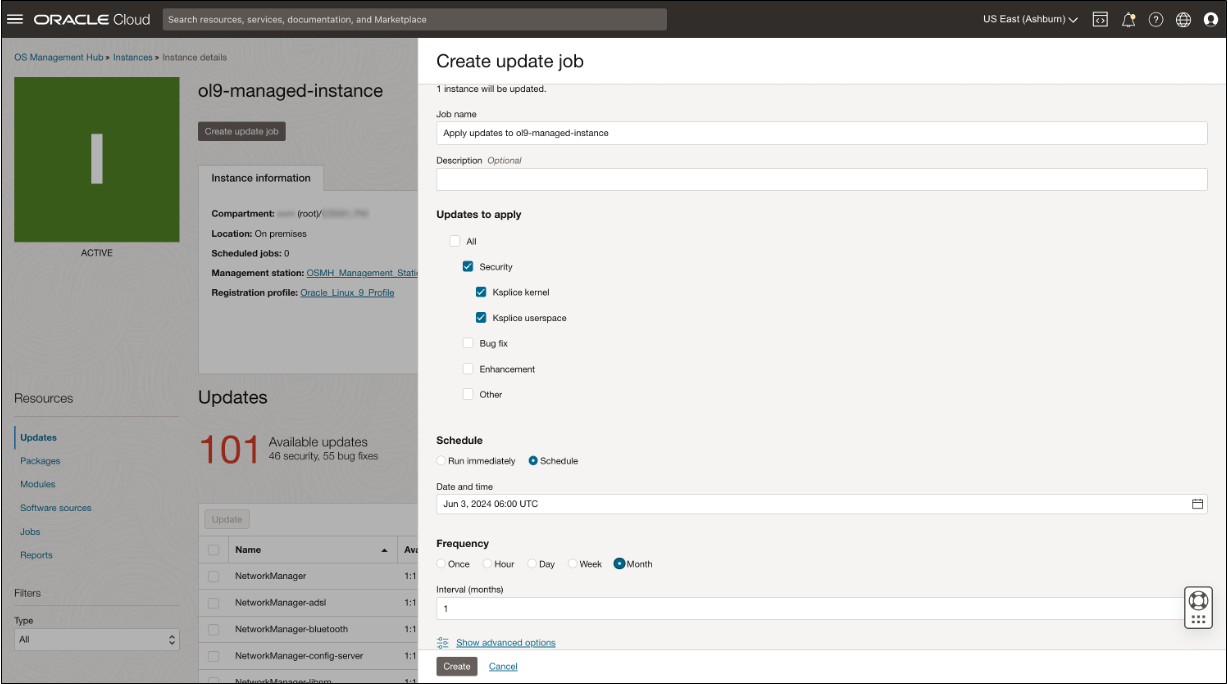
To help reduce management complexity while increasing efficiency and scalability, you can create a group of instances that are managed together to run standard tasks. Groups of instances must be of the same OS type, release, and architecture.
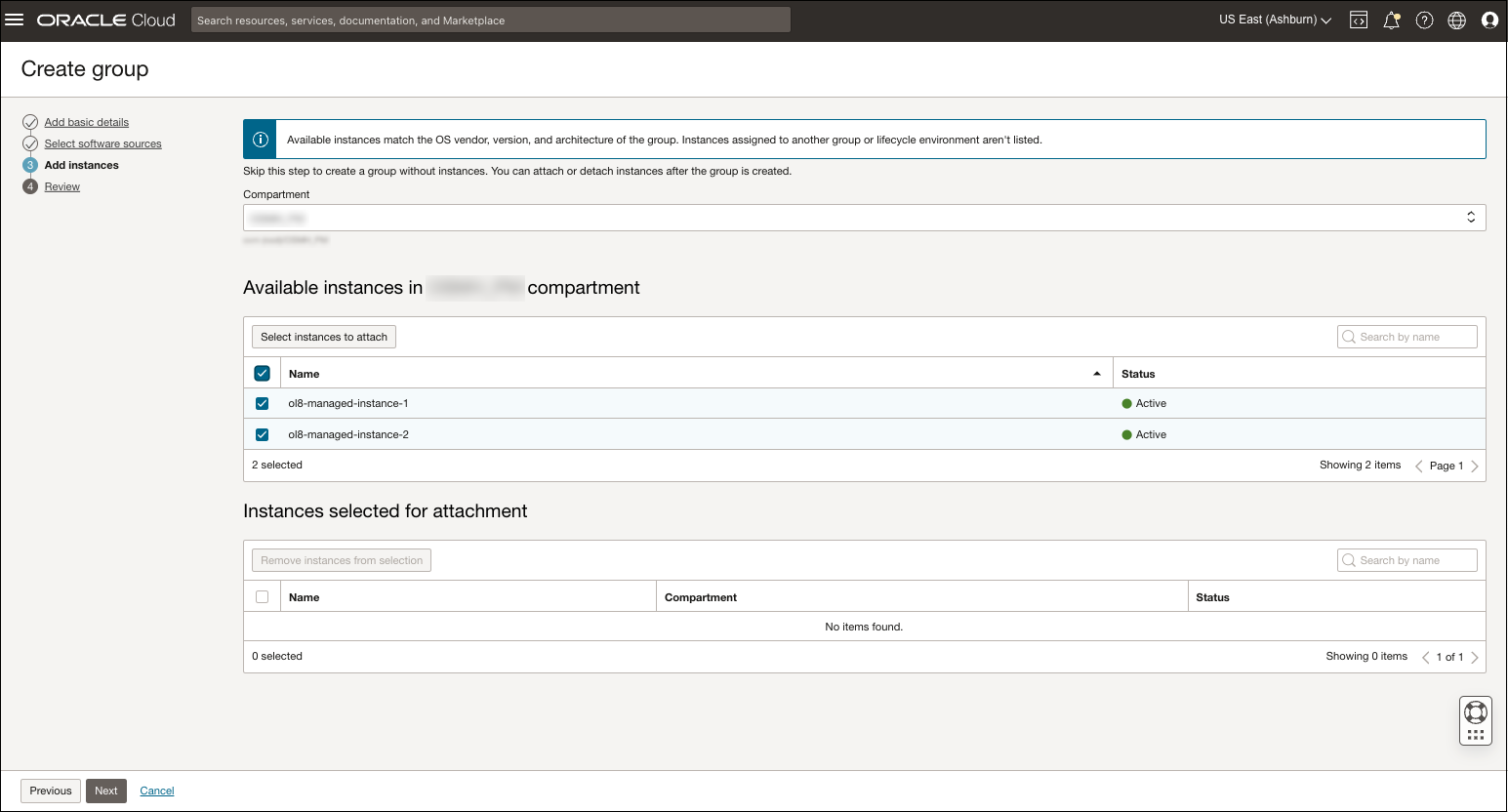
To manage Windows Server instances on OCI, you can filter and search for available and installed updates and apply updates. You can also run jobs to update groups of instances with the option to apply updates immediately or at a one-time or recurring schedule.
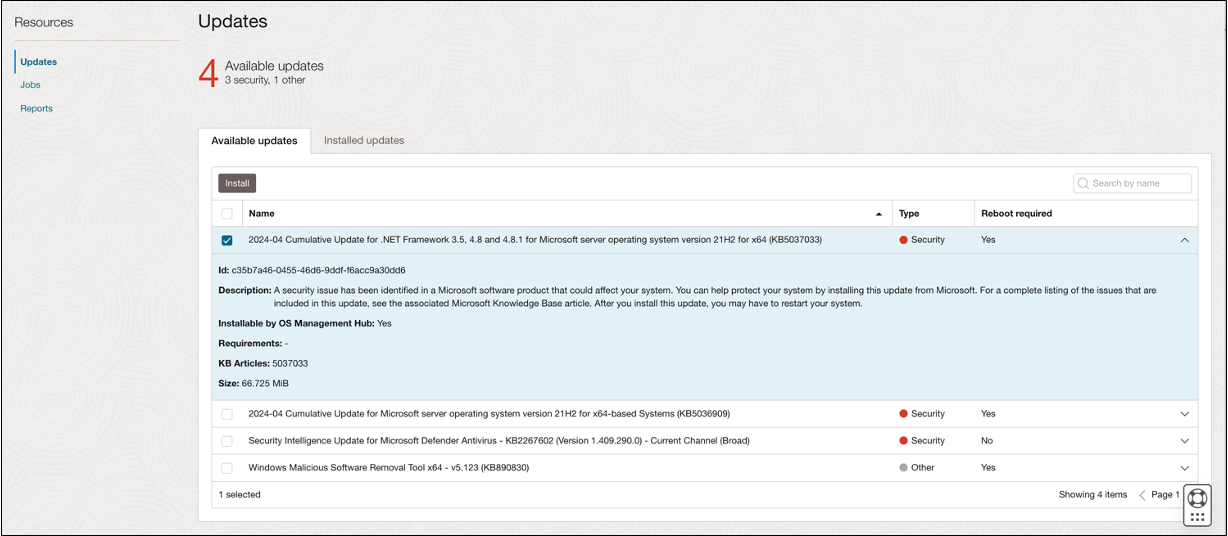
Simplified control of Oracle Linux updates across the lifecycle
OS Management Hub simplifies the management of Oracle Linux instances and helps ensure the consistency and integrity of systems across a lifecycle environment, which is a user-defined pipeline to deliver curated, versioned content in a prescribed, methodical manner. Typical Oracle Linux environments implement an application and system software lifecycle approach known as development, test, acceptance, and production (DTAP). To support this approach, you can define your lifecycle environment and stages for managing your Oracle Linux deployments. You can move content from one stage to another by promoting a curated set of updates across the lifecycle stages.
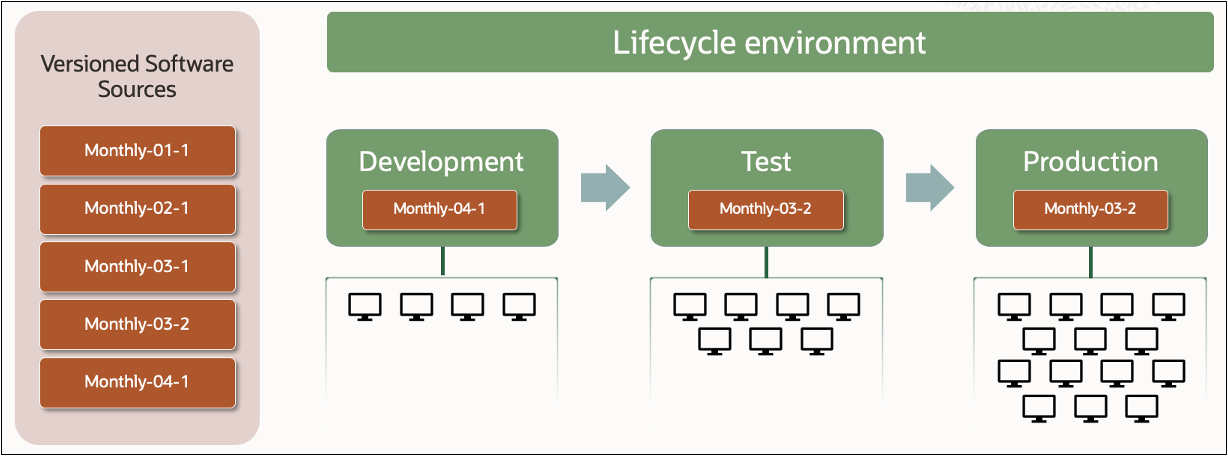
To complete this process using OS Management Hub, you define your lifecycle stages, assign instances to each stage, and create versioned custom software sources. A versioned custom software source is a software repository that you create with curated content that’s assigned a version designator. It’s immutable and can only be used to manage content for lifecycle environments.
You can then promote content by associating a versioned custom software source to a lifecycle stage. Only the instances assigned to that stage have access to the content in the versioned custom software source.
To promote the OS content, you can run the update job immediately or on a schedule.
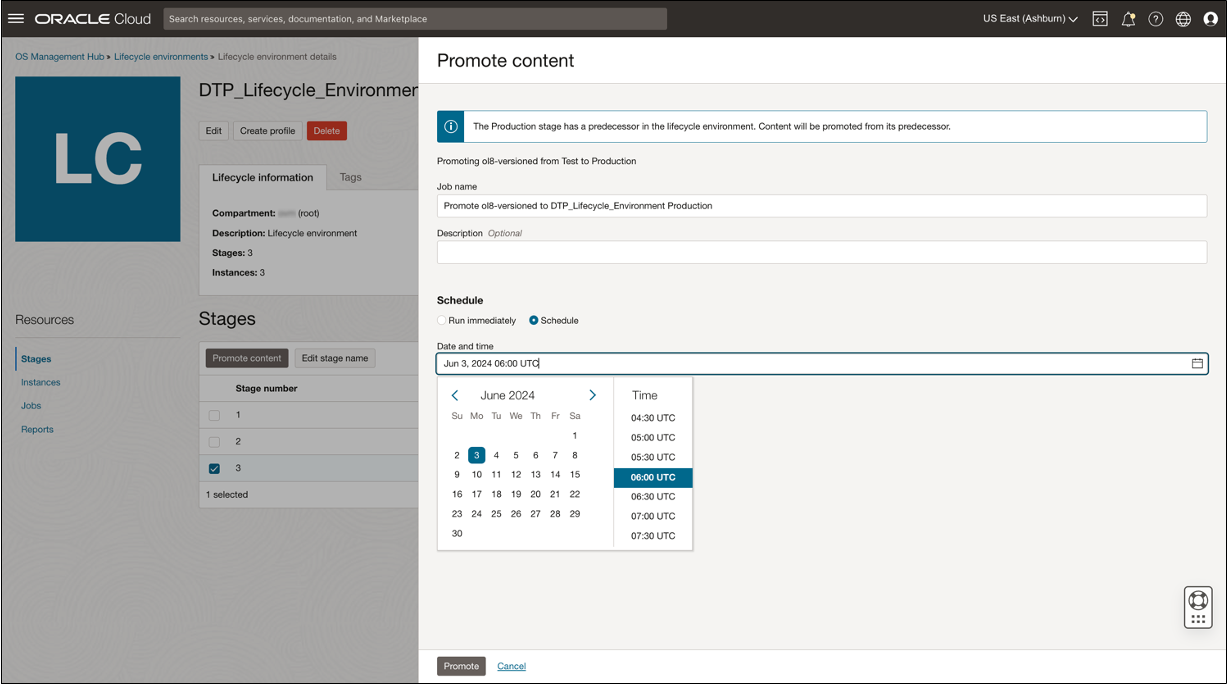
Stay compliant with security vulnerability reports
The OS Management Hub vulnerability report helps ensure that your systems are compliant and up to date with security updates. The Oracle Linux vulnerability report displays details about security advisories and their associated common vulnerabilities and exposures (CVEs). It lets you know which packages are affected by the advisory, and you can install the critical packages directly from the Console.
The Windows vulnerability report provides details of the available updates and reboot requirements. From this report, you can install available Windows updates immediately or on a schedule.
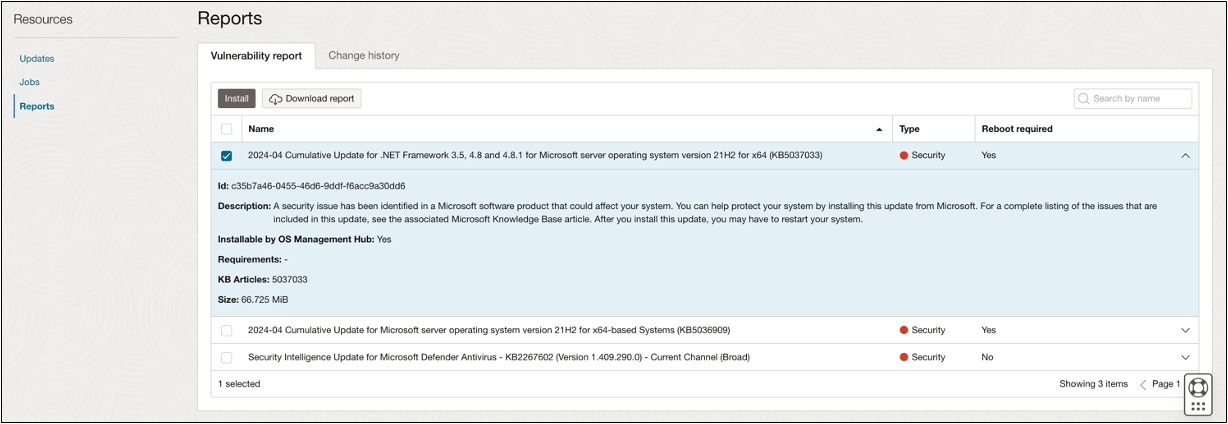
Vulnerability reports can be downloaded in CSV, JSON, or XML formats.
Value added with your OCI and Oracle Linux Support subscription
OCI subscriptions include the use of OS Management Hub to manage Oracle Linux and Windows instances in OCI at no extra cost. Oracle Linux Support (Basic and Premier) includes support for managing Oracle Linux systems on-premises, and in Azure and AWS. Oracle Linux Support customers can use their existing OCI account or contact Oracle Linux Sales to register for one to access OS Management Hub. Note that OS Management Hub is not available with OCI Free Tier accounts and compute instances.
Getting started with OS Management Hub
You can access the OS Management Hub service by logging in to your OCI account, navigating to the Oracle Cloud Console main menu, selecting Observability & Management, then selecting OS Management Hub. For more information on how to configure and use OS Management Hub, refer to the documentation.
Current users of the first generation OS Management Service can take advantage of the new interface and features including Oracle Linux lifecycle management by migrating their Oracle Linux and Windows instances in OCI to OS Management Hub. You can also migrate Autonomous Linux instances from OS Management Service, which you can then manage from the Oracle Cloud Console by navigating to the main menu, selecting Observability & Management and then Autonomous Linux. Visit the instructions on how to migrate from OS Management Service to OS Management Hub. Note that effective April 23, 2025, OS Management Service reaches end of life and is replaced by OS Management Hub.
Resources
For more information on OS Management Hub and related resources, visit:
- OS Management Hub
- OS Management Hub documentation
- OS Management Hub training
- Oracle Linux
- Oracle Linux documentation and training
- Oracle Linux Support
Get the latest news, tech tips, and more by subscribing to the Oracle Linux and Virtualization monthly newsletter.
